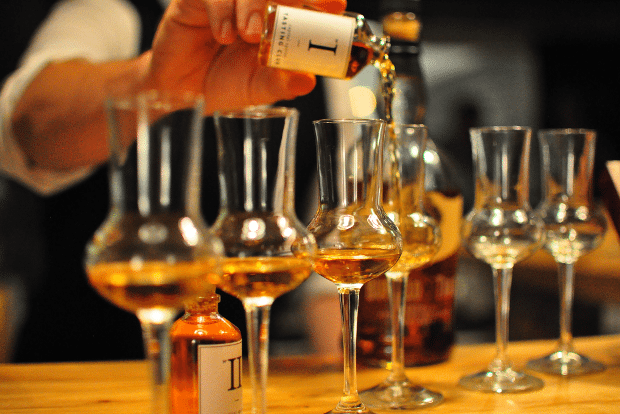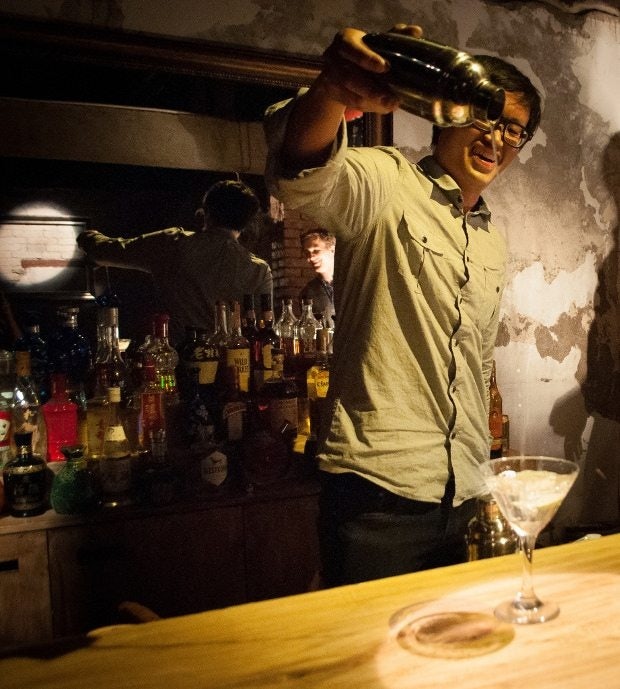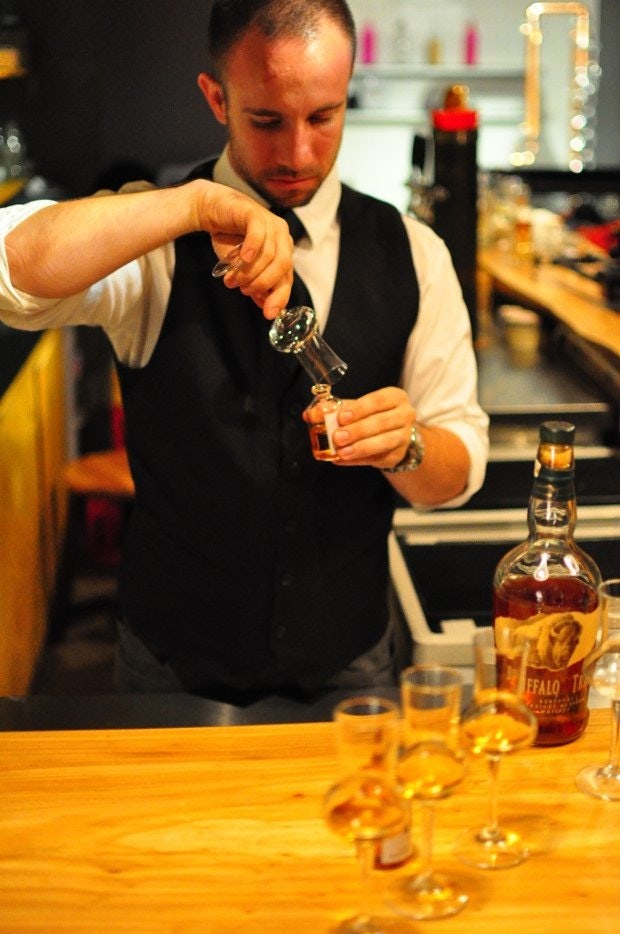
There is baijiu, there are Western spirits, and there are the entrepreneurs who have managed to juggle them both in China despite a market that heavily favors the former. Baijiu sales, which already take up a huge chunk of the market, have been back on the rise even during the ongoing the anti-corruption campaign. Still, the brains behind Beijing's only baijiu bar, Capital Spirits, are broadening their focus and embarking on an O2O venture called the Capital Spirits Tasting Club that will educate consumers on the ins and outs of imported spirits.
The Tasting Club, which launched in December on both a bilingual independent platform and on WeChat is not only the first of its kind in China; it is one of many projects that co-founders Bill Isler, Simon Dang, and Matthias Heger are working on to educate the growing (and thirsty) Chinese middle class. These include both a B2B consultancy and a new bar, The Distillery, which offers rotating flights each featuring different categories of spirits, as well as an exchange program that diversifies their selection by encouraging customers to bring in interesting bottles from their global travels. Meanwhile, the trio's newest venture, Tasting Club, so far allows its members to sample American whiskeys via four 60 ml vials of Maker's Mark, Knob Creek, Sazerac Rye, and Buffalo Trace. Rum is on its way to being added to the mix for paying members.
Those in the imported spirits industry are counting on the fact that the baijiu market is shrinking as the baijiu drinkers are dying off, but they're also competing against the youth favorites, beer and wine, both in terms of market share and subscription-based tasting clubs. The Tasting Club founders, however, are confident and experienced. Isler has more than a decade in the bar industry in Beijing, while Dang has been picking apart what it takes to appeal to a Chinese consumer at his job in PR. We asked them about how they're making the bar experience more accessible and what the imported spirits industry looks like in China.
How does the Tasting Club work?#
Dang:#
It's like an online course for learning about spirits, but it's mostly geared toward the domestic market. I have a lot of coworkers who have money and want to learn more about foreign culture and they go to a bar, and they don't really know about different types of spirits. They may know a couple things like vodka or gin, but they don't really know the difference between, say, bourbon and scotch. It's a membership-based program, where once you get into the club, you buy subscriptions and we'll send you a little tasting flight of different types of spirits every month. They come with cards, so they can read about it, and they also have access to the website with educational videos. We're trying to gear toward more craft spirits from around the world, not common brands.
Isler:#
Members can have a profile and can even tick off countries on a world map from which they've tasted spirits, and they can also interact with other members and organize meet-ups in their locales so they can do the tastings together and organize their own events. And we would like to travel to some of the larger places and organize events as well.

Who is your target market?#
Dang:#
We're looking at two. One of them will be middle-class office workers between 25 to 35 years old, and then there's going to be more of a higher bracket that we're going to appeal to, and those guys will have more premium liquor. That's going to be a smaller, VIP group. For them, we're also planning to do private tours, but that's going to be later. The first wave is going to be more targeted to the mass market.
What does the Chinese market need in terms of Western spirits education? Where are we at now, and what's missing?#
Isler:#
There is a lot of education about brands, but not a lot of education about what is in the bottles or how to drink spirits. Spirits companies are using the same strategy as luxury brands, where they have a recognizable logo and name. But if you look at what's happening when you go to a place like The Distillery or Janes and Hooch or you go to Liquid Laundry in Shanghai, they give a very different view of where the Chinese market is at in the majority of the country.
I was just at an alcohol industry fair, and consumers still just want stuff they can mix with green tea at KTVs. That's still where we are. It's still all about brands. If you look at the ads that Johnnie Walker is doing here, to be fair, it's the same that you see in the West—it's not like every foreigner knows what whisky is made out of or knows how to appreciate it either. But here, it's really all about promoting the lifestyle behind the spirit.

What are you seeing in terms of trends regarding spirits in China?#
Dang:#
The younger, white-collar crowds are going toward more Western spirits than what's produced in China. We see that at our baijiu bar everyday. They're interested in baijiu obviously, but it's kind of a novelty to come to the bar. If they're going to go out, they're going to go to a Western bar and try to learn about some of these cocktails. That's why I think there's a huge opportunity to tap into that. It's definitely growing, especially in first-tier cities.
Are there spirits that people are leaning toward?#
Isler:#
Japanese whisky is very hot these days. The bars have already opened, but more and more Chinese people are going.
Isn't there a lack of people who like to drink spirits without mixers? How do you plan on dealing with that challenge?#
Dang:#
This is about educating them on the actual spirits, so we encourage them to drink it straight, and they have the option of getting tasting glasses as well so they can smell it and look at the color. Eventually on our website, we'll have recipes as well, so if they want to buy a bottle, make drinks at home, and entertain their friends, they can do that.
We're seeing a ready-made cocktail trend in China—will this create a diversion in terms of spirits education?#
Dang:#
Yeah, totally. There are a lot of ready-mix cocktails. It's not the direction you'd expect. To sell consumers a ready-mixed drink is not the same.
Isler:#
We have a client that wants us to make a ready-made cocktail with baijiu. But it's for a different market. It's for KTVs, third-tier cities, and 7-11s. It's not for the same people in these bars. The huge problem with it, though, is what they call alcopops in the U.S., they call premixed cocktails in China, and it kind of gives cocktail culture a bad name. It's not really a cocktail, it's an alcopop. I'm not really happy about that. It possibly could affect someone's idea of what a cocktail is.
What marketing trends are working?#
Dang:#
You'll see a lot of clubs that are sponsored by Western brands using social media and having spokespeople talking about those brands, and that generates the interest. I see a lot of that. I also see the advertisements. Where I work, one of our clients is a big-brand spirit, so we do a lot of cocktail competitions with big-name bartenders from Shanghai and Beijing. We bring in a lot of media to come and watch and hopefully we'll get some coverage. That's been pretty good too—just having the name out there. Every week we'll have certain parties going on at certain clubs. That's been a successful way to go, but I haven't seen any grassroots projects like what we're trying to do with educating the consumers first.
How is the growth of e-commerce going to affect the cocktail and spirits industry?#
Dang:#
You come to a bar not just to drink; you come to a bar to socialize. E-commerce is definitely going to have a purpose because it's going to expedite the process of sourcing and buying good drinks, but I don't think it's going to take away from the experience of going to a bar and meeting people and having a really good bartender mix a cocktail and talk to them.